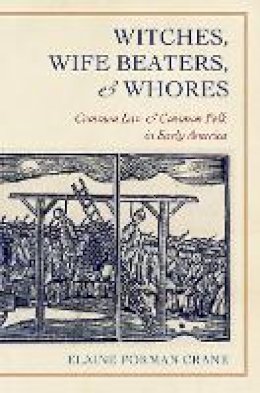Elaine Forman Crane is Professor of History at Fordham University. She is the author of several books, including Killed Strangely: The Death of Rebecca Cornell, also from Cornell.
Crane delves deeply into the historical record—particularly legal documents—to present sometimes salacious and always fascinating stories of illegal activities from the past and the ways that individuals and communities sought to right wrongs and mete out punishments.... Crane has selected remarkable stories and pieced together an incredible array of detail from the available documents. - Bridget M. Marshall (Early American Literature) Crane's earlier microhistory, Killed Strangely, proved her mastery of the genre, and this new book moves us a step closer to understanding law's place in the construction of American society and institutions. A successful legal microhistory has four characteristics: The work must tell a compelling story; place the events in a larger historical context; analyze legal issues without losing the narrative thread; and explain how the case illuminates the rule of law in society. Crane succeeds in every respect. Her stories grab our attention, enlarge our understanding through the power of example, and leave us better equipped to identify significant trends. Morever, Crane offers us a master class in the scrupulous interpretation of court records. Her rigorous interrogation of her sources, exposing all their ambiguities and lacunae, furnishes a model for all who would practice the historian's craft. (American Historical Review) Elaine Forman Crane has unearthed unique stories in local records across both space and time, from mid-seventeenth-century New Amsterdam and Bermuda to eighteenth-century New England to postrevolutionary Maryland. The matters these cases addressed were as diverse as the places they occurred, and Crane uses each chapter to craft a story about such issues as the power of words, domestic violence, rape, and loss of economic stability. Each vignette illustrates how ordinary people's negotiations of extraordinary circumstances helped create distinctively American legal cultures.... Crane's work pokes holes in such generalization as those on the rise of companionate marriage and the relationship between economic and legal power in early America. With this series of local studies Crane contributes even more evidence to support the argument that Americans shaped their law to meet needs peculiar to their own time and place. (Journal of American History) Elaine Forman Crane offers a new variation by using the common theme of legal interactions among Europeans and Africans in colonial North America to link six individual microhistories in a single volume.... The greatest strength of Witches, Wife Beaters, and Whores is Crane's discussion of trials from four very different colonies.... Crane's research, analysis, and storytelling skills are impeccable. Witches, Wife Beaters, and Whores provides readers with a vivid array of characters seemingly designed to walk into lecture halls and dinner-table conversations as illustrations of the rich and complex world of colonial America. (William and Mary Quarterly) This enthralling, deeply researched work demonstrates vividly that early Americans lived in a world saturated by the law. Crane is interested specifically in the 'common folk' of her title; tavern keepers, merchants, a handful of witches, murdered and battered wives, an enslaved black man. To uncover how the law suffused their world, Crane employs the methodology of microhistory, an approach used with great success by historians seeking to discern the lives and mentalities of those often not able to speak for themselves. Crane has undertaken research in challenging sources. Even more impressively, she has taken snippets of information and woven them into engaging, moving, and occasionally riveting stories. Crane demonstrates through her painstakingly re-created life histories just how much 'legal culture and the routine of daily life were knotted together in early America.'... Crane's admirable book is likely to inspire many further studies that will help answer some important questions. In the meantime, she has blazed a trail with her exemplary study, demonstrating that it is possible to bring the dead to life even without the aid of a ghost. Instead, Crane offers us an engaging and detailed analysis of how ordinary people understood and deployed the law in the most adverse circumstances, drawing us in with stories that are sometimes heartbreaking, sometimes funny, sometimes confounding, but always intriguing and absorbing. (Common-place)

